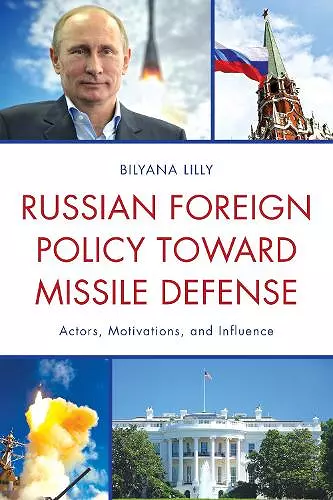Russian Foreign Policy toward Missile Defense
Actors, Motivations, and Influence
Format:Hardback
Publisher:Lexington Books
Published:21st Aug '14
Currently unavailable, and unfortunately no date known when it will be back

This book is devoted to one of the central issues in U.S.-Russian and NATO-Russian relations—ballistic missile defense. Drawing on more than 2,000 primary sources, interviews with Russian and NATO officials, and a variety of Russian and Western publications, this book offers an unparalleled, in-depth analysis of the reasons behind Russia’s policy towards the construction of a U.S ballistic missile defense in Europe. It provides a critical assessment of the decision-making mechanisms that shape Russia’s position on ballistic missile defense, as well as Russia’s strategic relations with the United States and Russia’s interaction with European and non-European powers. Lilly argues that contrary to Moscow’s official claims during the Putin era, Russian objections to the construction of ballistic missile defense in Europe have not been wholly dictated by security concerns. To Russia, missile defense is not purely an issue in and of itself, but rather a symbol and instrument of broader political considerations. At the international level, the factors that have shaped Russia’s response include Moscow’s perception of the overall state of U.S.-Russian relations, the Kremlin’s capacity to project influence and power abroad, and NATO’s behavior in the post-Soviet space. Domestically, the issue of missile defense has been a facilitating instrument for strengthening Putin’s regime and justifying military modernization. Taken together, these instrumental considerations and their fluctuating intensity in different periods prompt the Russian leadership to pursue contradictory policy approaches simultaneously. On the one hand, the Kremlin seeks U.S. cooperation, while on the other hand, it threatens retaliation and reinforces Russian offensive capabilities. The result is Moscow’s incoherence, inconsistency, and double-speak over the issue of missile defense.
Bilyana Lily . . . has written the most comprehensive study available on Russia’s Ballistic Missile Defense policies. In the course of her book Russian Foreign Policy toward Missile Defense: Actors, Motivations, and Influence, drawing on a huge array of media sources as well as interviews, she demonstrates how these policies serve as a barometer for measuring US-Russia and US-NATO relations, as well as how they illustrate the complex interplay of factions and forces among Russia’s elite. * New Books Network *
Lilly has provided readers with a most comprehensive analysis of the complex variables shaping the Russian response to the U.S. missile defense program. She enlightens us regarding both the domestic dimensions of Russian decision-making as well as Russian goals with respect to NATO and the United States. Her scholarship is especially impressive in the large number of Russian sources she used and the many interviews she has conducted with Russian officials. -- Richard Weitz, Center for Political-Military Analysis, Hudson Institute
Bilyana Lilly professionally captures the critical issues, relationships, and environment between the United States, Europe, and Russia as the United States developed and deployed its own missile defense system and planned, in conjunction with NATO, to defend Europe from the emerging Iranian missile threat. Her extensive research, remarkable interviews, and analysis provides extraordinary insight and perspective into this high profile, high stakes arena. -- General Henry A. Obering III, former director of the U.S. Missile Defense Agency, Office of the Secretary of Defense
ISBN: 9780739183847
Dimensions: 234mm x 161mm x 33mm
Weight: 708g
390 pages